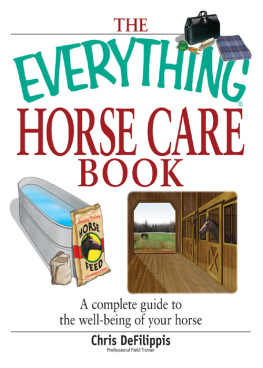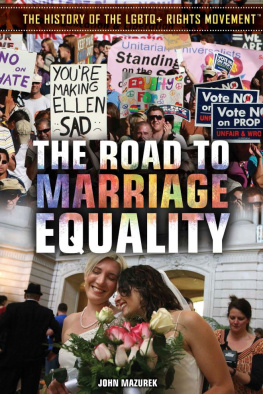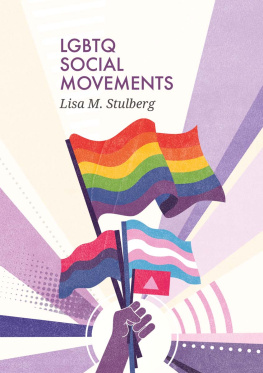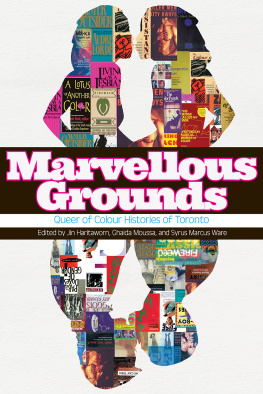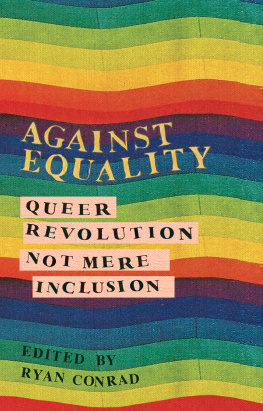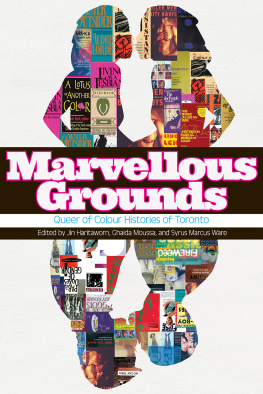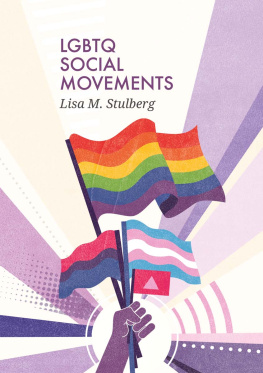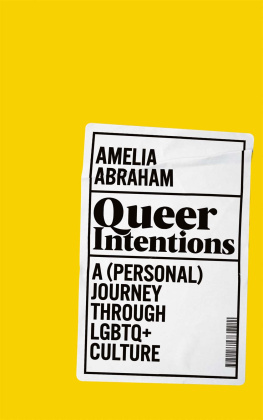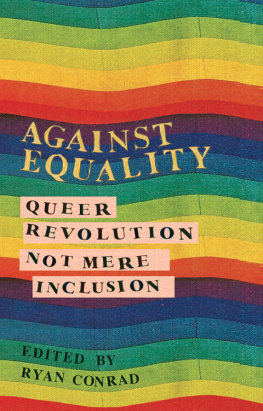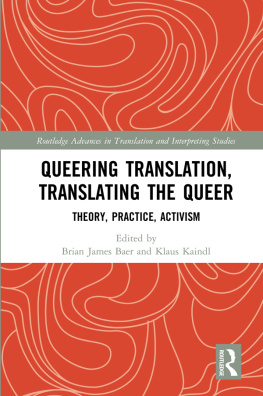
QUEER ACTIVISM AFTER MARRIAGE EQUALITY
Queer Activism After Marriage Equality focuses on the implications of legal same-sex marriage for LGBTQ social movements and organizing. It asks how the agendas, strategies, structures, and financing of LGBTQ movement organizations are changing now that same-sex marriage is legal in some countries.
Building on a major conference held in 2016 entitled After Marriage: The Future of LGBTQ Politics and Scholarship, this collection draws from critical and intersectional perspectives to explore the questions and issues facing the next chapter of LGBTQ activism and social movement work. It comprises academic papers, international case studies, edited transcripts of selected conference sessions, and interviews with activists. These take a critical look at the high-profile work of national and state-wide equality organizations, analyzing the costs of winning marriage equality and what that has meant for other LGBTQ activism. In addition to this, the book examines other forms of queer activism that have existed for years in the shadow of the marriage equality movement, as well as new social movements that have developed more recently. Finally, it looks to examples of activism in other countries and considers lessons U.S. activists can learn from them.
By presenting research on these and other trends, this volume helps translate queer critiques advanced during the marriage campaigns into a framework for ongoing critical research in the after-marriage period.
Joseph Nicholas DeFilippis is the founder and former Executive Director of Queers for Economic Justice, and worked as an activist for over two decades. He is currently Assistant Professor of Social Work at Seattle University, U.S.A., and has written about queer social movements, poverty, and marriage politics.
Michael W. Yarbrough is an interdisciplinary social scientist whose work explores the intersection of law, culture, and family. He is Assistant Professor of Law and Society in the Political Science Department of John Jay College of Criminal Justice (CUNY), U.S.A., and a Research Associate in the Department of Sociology, Faculty of Humanities, at the University of Johannesburg, South Africa.
Angela Jones is Associate Professor of Sociology at Farmingdale State College, SUNY, USA. Her research interests include African American political thought and protest, gender, and sexuality. Jones is the author of four books and numerous scholarly articles in peer-reviewed journals.
First published 2018
by Routledge
2 Park Square, Milton Park, Abingdon, Oxon OX14 4RN
and by Routledge
711 Third Avenue, New York, NY 10017
Routledge is an imprint of the Taylor & Francis Group, an informa business
2018 selection and editorial matter, Joseph Nicholas DeFilippis, Michael W. Yarbrough, and Angela Jones; individual chapters, the contributors
The right of Joseph Nicholas DeFilippis, Michael W. Yarbrough, and Angela Jones to be identified as the authors of the editorial material, and of the authors for their individual chapters, has been asserted in accordance with sections 77 and 78 of the Copyright, Designs and Patents Act 1988.
All rights reserved. No part of this book may be reprinted or reproduced or utilised in any form or by any electronic, mechanical, or other means, now known or hereafter invented, including photocopying and recording, or in any information storage or retrieval system, without permission in writing from the publishers.
Trademark notice: Product or corporate names may be trademarks or registered trademarks, and are used only for identification and explanation without intent to infringe.
British Library Cataloguing-in-Publication Data
A catalogue record for this book is available from the British Library
Library of Congress Cataloging-in-Publication Data
A catalog record has been requested for this title.
ISBN: 978-1-138-55749-9 (hbk)
ISBN: 978-1-138-55750-5 (pbk)
ISBN: 978-1-315-15109-0 (ebk)
Typeset in Bembo
by Sunrise Setting Ltd, Brixham, UK
CONTENTS
List of contributors
Joseph Nicholas DeFilippis
Edited by Joseph Nicholas DeFilippis
Chriss V. Sneed
Myrl Beam
Joseph Nicholas DeFilippis
Joseph Nicholas DeFilippis
Joseph Nicholas DeFilippis
Courtenay W. Daum
Siobhn McGuirk, Jara M. Carrington, Claudia Cojocaru, Jamila Hammami, and Marzena Zukowska
A presentation by Raha Iranian Feminist Collective
Caner Hazar
Hugo Bouvard
Gracia Trujillo
Two Junes, a year apart, frame the mission of this collection. In June 2015, the U.S. Supreme Court ruled that that countrys constitution forbids the exclusion of same-sex couples from legally recognized marriage. Arriving after a hard and often painful fight, the ruling seemed to many to mark a new kind of inclusion. Rainbows wrapped many of our public spaces, from profile pics to the White House, in triumphant celebration.
One year later, in June 2016, a massacre on Latin night at Pulse nightclub in Orlando shocked the nation and the world. Many felt the shock of disbelief. But many LGBTQ people, especially LGBTQ people of color, felt the shock of recognition at a familiar violence that marriage did little to address.
Fiercely debated for many years, same-sex marriage has become a legal reality in a rapidly growing number of jurisdictions around the world. First enacted in 2001 in the Netherlands, same-sex marriage is now legally recognized in over 20 countries,1 approximately three-quarters of which legalized it in the past half-decade. At the same time, these sweeping gains have often triggered significant backlash both where they have occurred and elsewhere. Homosexual acts are currently criminalized in 75 countries, including ten where they can be punished by death. Such violent backlash is an especially visible manifestation of a complex range of consequences that have accompanied same-sex marriage. In the United States, for example, same-sex marriage has channeled the priorities of national LGBTQ and state-wide equality organizations away from other issues, reduced the availability of other forms of legal recognition for families, and generally reinforced mainstream family norms.
The time is thus ripe to (1) examine this key moment in the ongoing history of LGBTQ communities; (2) interrogate predictions by scholars and activists about what social changes same-sex marriage would produce; and (3) consider paths forward for LGBTQ scholarship and politics.
The After Marriage Equality collection was designed to tackle these three broad themes. Queer Families and Relationships After Marriage Equality focuses on the legal, material, and cultural impacts of legal marriage equality on diverse queer families and relationships. Queer Activism After Marriage Equality focuses on the implications of legal same-sex marriage for LGBTQ social movements and examines what queer activism looks like now that the national gay and lesbian organizations have succeeded in achieving their main priorities. The Unfinished Queer Agenda After Marriage Equality focuses on dire issues facing LGBTQ individuals and communities that were eclipsed by the marriage equality movement, such as policing, immigration, health care, homelessness, violence, poverty, and more.
All three titles draw their materials from a major conference held at John Jay College of Criminal Justice on October 12, 2016 and organized by CLAGS: The Center for LGBTQ Studies, based at the City University of New York (CUNY). This conference, entitled After Marriage: The Future of LGBTQ Politics and Scholarship, staged an open, diverse, and critical conversation among over 175 academic, activist, and artist speakers. Approximately 450 people attended, and the conference was also streamed online. Building on similar conversations LGBTQ activists have been having among themselves for some time, this was to our knowledge the largest public conversation focused on this theme, and the only one combining critical and intersectional perspectives with extensive dialogue among both scholars and activists. The conference was supported in part by a grant from the American Sociological Association and the National Science Foundation, by the Office for the Advancement of Research at John Jay College of Criminal Justice, and by the Center for the Study of Gender and Sexuality at New York University. We would like to thank our colleagues on the CLAGS staff and the conference organizing committee who helped make the conference a reality: Yana Calou, Stephanie Hsu, Bianca Laureano, Kevin Nadal, Noam Parness, Jasmina Sinanovic, Andrew Spieldenner, Nicole Vitrit, and Kalle Westerling. In addition, we are so grateful to our editor at Routledge, Alexandra McGregor, whose support and enthusiasm for this project was unwavering. We would be remiss if we did not thank our editorial assistant at Routledge, Kitty Imbert, who shepherded us through the entire publication process.



